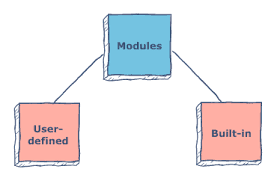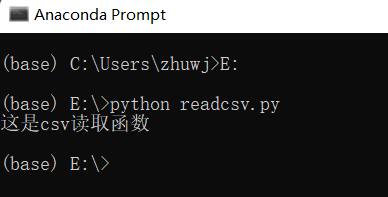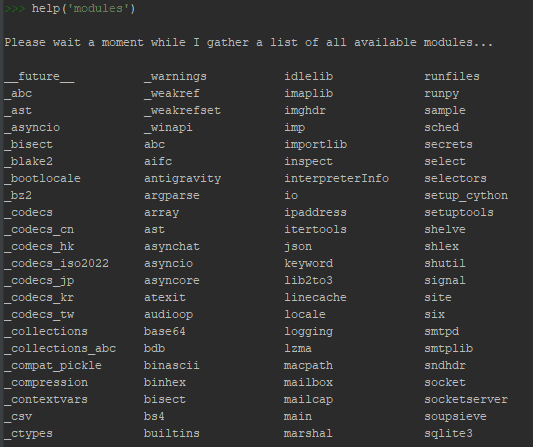 Backend Development
Backend Development
 Python Tutorial
Python Tutorial
 How to understand Python modules in the simplest and most popular way?
How to understand Python modules in the simplest and most popular way?
How to understand Python modules in the simplest and most popular way?
To put it simply, a Python module is an executable file with a .py suffix, which is used to repeatedly call variables and functions.

For example, if you repeatedly need to read CSV files during the data analysis process, in addition to using ready-made library methods such as pandas, you can also write a module for calling .
# -*- coding: utf-8 -*- import csv desc = '这是csv读取函数' print(desc) def read_csv(path): with open(path, newline='') as csvfile: reader = csv.DictReader(csvfile) for i in reader: print(i)
You only need to save the above script as a .py file, and then you can import the read_csv function in it and call it directly in your code.
For example, I save the script as readcsv.py and store it in the current folder. When calling it in the new code, I only need to pass in the csv file path name to read the corresponding file.
from readcsv import read_csv
read_csv("e:\test.csv")Get the following results:

#This is a written module. You can call it anytime and anywhere without having to write it repeatedly in the code. Complex methods.
We see that after running the code, the constants of the module are directly used, and the functions of the module are also called, which involves the function definition of the module:
❝Python module ( Module), is a Python file ending with .py, containing Python object definitions and Python statements. ❞
The module is equivalent to an encapsulated toolbox, you only need to pass in the relevant parameters, You can use its functions.
Generally, large-scale Python code projects will have many modules to make the logic clearer.
In addition to importing through import, .py module files can also be run directly as scripts.
We switch to the directory where the script is located on the command line and enter:
python readcsv.py
to directly execute the corresponding code:

If you Add the if __name__ == "__main__": statement to the script code, then the code following the statement will only take effect when the script is executed directly, and will not be executed when the module is imported.
# -*- coding: utf-8 -*-
import csv
desc = '这是csv读取函数'
print(desc)
def read_csv(path):
with open(path, newline='') as csvfile:
reader = csv.DictReader(csvfile)
for i in reader:
print(i)
if __name__ == "__main__":
print("直接运行脚本时生效")This is also a question that confuses many people. If __name__ == "__main__": What is the use?
__main__ always refers to the name of the current execution module (including the suffix .py) .
__name__ is a built-in variable. When the module is executed directly, __name__ is equal to the file name (including the suffix .py).
If the module is imported into other modules, the __name__ of the module is equal to the module name (excluding the suffix .py).
So when the script is executed directly, __name__ == "__main__" is true and the following code can continue to be executed.
When importing a module, __name__ == "__main__" is false, which is not true, and the following code cannot be executed.
This operation is often used to provide a convenient user interface for the module, or for testing (running the module as a script that executes a test suite).
The following are commonly used built-in modules in Python for reference.

The above is the detailed content of How to understand Python modules in the simplest and most popular way?. For more information, please follow other related articles on the PHP Chinese website!

Hot AI Tools

Undresser.AI Undress
AI-powered app for creating realistic nude photos

AI Clothes Remover
Online AI tool for removing clothes from photos.

Undress AI Tool
Undress images for free

Clothoff.io
AI clothes remover

AI Hentai Generator
Generate AI Hentai for free.

Hot Article

Hot Tools

Notepad++7.3.1
Easy-to-use and free code editor

SublimeText3 Chinese version
Chinese version, very easy to use

Zend Studio 13.0.1
Powerful PHP integrated development environment

Dreamweaver CS6
Visual web development tools

SublimeText3 Mac version
God-level code editing software (SublimeText3)

Hot Topics
 How to download deepseek Xiaomi
Feb 19, 2025 pm 05:27 PM
How to download deepseek Xiaomi
Feb 19, 2025 pm 05:27 PM
How to download DeepSeek Xiaomi? Search for "DeepSeek" in the Xiaomi App Store. If it is not found, continue to step 2. Identify your needs (search files, data analysis), and find the corresponding tools (such as file managers, data analysis software) that include DeepSeek functions.
 How do you ask him deepseek
Feb 19, 2025 pm 04:42 PM
How do you ask him deepseek
Feb 19, 2025 pm 04:42 PM
The key to using DeepSeek effectively is to ask questions clearly: express the questions directly and specifically. Provide specific details and background information. For complex inquiries, multiple angles and refute opinions are included. Focus on specific aspects, such as performance bottlenecks in code. Keep a critical thinking about the answers you get and make judgments based on your expertise.
 How to search deepseek
Feb 19, 2025 pm 05:18 PM
How to search deepseek
Feb 19, 2025 pm 05:18 PM
Just use the search function that comes with DeepSeek. Its powerful semantic analysis algorithm can accurately understand the search intention and provide relevant information. However, for searches that are unpopular, latest information or problems that need to be considered, it is necessary to adjust keywords or use more specific descriptions, combine them with other real-time information sources, and understand that DeepSeek is just a tool that requires active, clear and refined search strategies.
 How to program deepseek
Feb 19, 2025 pm 05:36 PM
How to program deepseek
Feb 19, 2025 pm 05:36 PM
DeepSeek is not a programming language, but a deep search concept. Implementing DeepSeek requires selection based on existing languages. For different application scenarios, it is necessary to choose the appropriate language and algorithms, and combine machine learning technology. Code quality, maintainability, and testing are crucial. Only by choosing the right programming language, algorithms and tools according to your needs and writing high-quality code can DeepSeek be successfully implemented.
 How to use deepseek to settle accounts
Feb 19, 2025 pm 04:36 PM
How to use deepseek to settle accounts
Feb 19, 2025 pm 04:36 PM
Question: Is DeepSeek available for accounting? Answer: No, it is a data mining and analysis tool that can be used to analyze financial data, but it does not have the accounting record and report generation functions of accounting software. Using DeepSeek to analyze financial data requires writing code to process data with knowledge of data structures, algorithms, and DeepSeek APIs to consider potential problems (e.g. programming knowledge, learning curves, data quality)
 The Key to Coding: Unlocking the Power of Python for Beginners
Oct 11, 2024 pm 12:17 PM
The Key to Coding: Unlocking the Power of Python for Beginners
Oct 11, 2024 pm 12:17 PM
Python is an ideal programming introduction language for beginners through its ease of learning and powerful features. Its basics include: Variables: used to store data (numbers, strings, lists, etc.). Data type: Defines the type of data in the variable (integer, floating point, etc.). Operators: used for mathematical operations and comparisons. Control flow: Control the flow of code execution (conditional statements, loops).
 Problem-Solving with Python: Unlock Powerful Solutions as a Beginner Coder
Oct 11, 2024 pm 08:58 PM
Problem-Solving with Python: Unlock Powerful Solutions as a Beginner Coder
Oct 11, 2024 pm 08:58 PM
Pythonempowersbeginnersinproblem-solving.Itsuser-friendlysyntax,extensivelibrary,andfeaturessuchasvariables,conditionalstatements,andloopsenableefficientcodedevelopment.Frommanagingdatatocontrollingprogramflowandperformingrepetitivetasks,Pythonprovid
 How to access DeepSeekapi - DeepSeekapi access call tutorial
Mar 12, 2025 pm 12:24 PM
How to access DeepSeekapi - DeepSeekapi access call tutorial
Mar 12, 2025 pm 12:24 PM
Detailed explanation of DeepSeekAPI access and call: Quick Start Guide This article will guide you in detail how to access and call DeepSeekAPI, helping you easily use powerful AI models. Step 1: Get the API key to access the DeepSeek official website and click on the "Open Platform" in the upper right corner. You will get a certain number of free tokens (used to measure API usage). In the menu on the left, click "APIKeys" and then click "Create APIkey". Name your APIkey (for example, "test") and copy the generated key right away. Be sure to save this key properly, as it will only be displayed once





